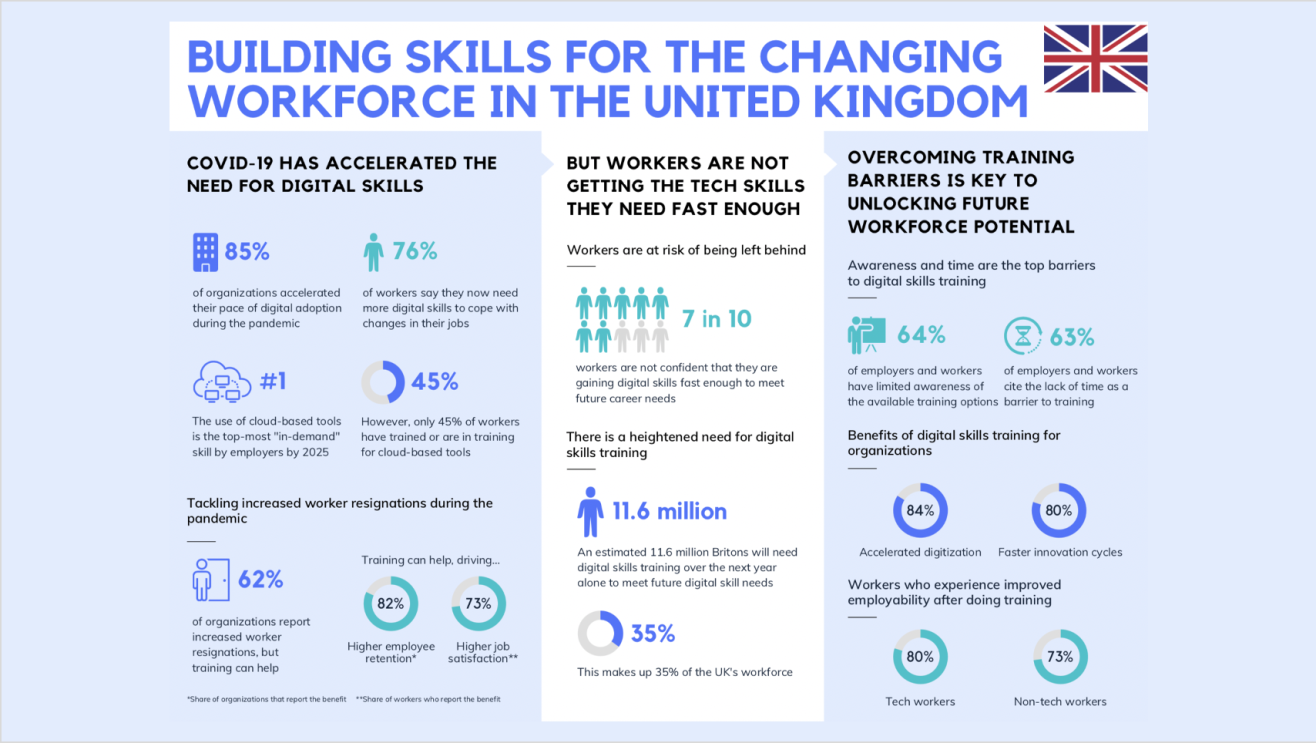Findings from a new study has revealed that there is an acute skills training shortfall in the UK today, with an estimated 11.6 million Britons, or 35% of the country’s workforce, requiring digital skills training over the next year alone in order to keep pace with technological advancements and gain new digital skills to succeed in their careers.
While 96% of organisations surveyed in the UK see a need to train their employees on digital skills, only 29% have implemented a plan to do so – resulting in a training shortfall where 67% of organisations are not undertaking training.
The Amazon Web Services (AWS) Global Digital Skills Study, which was conducted by AlphaBeta, surveyed employer and employee perceptions of digital skills training in 12 countries around the world, including the UK.
The study identified three main takeaways: there is an accelerated need for digital skills training caused by the COVID-19 pandemic; there is a significant training shortfall; there are opportunities for both employers and employees alike to unlock the future workforce potential.

Here’s what the study found in the UK.
The accelerated need for digital skills training
Digital skills have become a widespread requirement for organisations in the UK with over 80 per cent of job openings requiring them. In the study, both employers and workers report significant benefits from investing in digital skills training:
- Over 80 per cent of employers say that digital skills training has brought about significant improvements for their organisations, such as faster innovation cycles (80 per cent of employers), cost efficiencies (83 per cent) and increased revenue (82 per cent)
- 83 per cent of the workers surveyed said they feel that digital skills training has helped them better apply technologies, and become more efficient at work. Other benefits experienced by workers include higher personal satisfaction (80 per cent), improved employability (77 per cent) and increased promotion opportunities (66 per cent)
Digital skills training is not just beneficial for tech workers – it’s essential for non-tech workers too:
- In the UK, 73 per cent of non-tech workers say that digital skills training has improved their employability by allowing them to keep up to date with the latest technologies
- 66 per cent of these non-tech workers also say that pursuing digital skills training increased their ability to make career switches
The study also revealed the need for cloud computing and technical skills training in the UK is increasing, a trend intensified by technology changes driven by the COVID-19 pandemic:
- 85 per cent of the UK organisations surveyed say that the pandemic has accelerated the pace of digital adoption in their organisations
- 76 per cent of workers in the UK feel that they now require more digital skills to cope with changes in their jobs due to COVID-19
This means that even as the world emerges from the COVID-19 pandemic, the strong demand for technology talent will continue. As new roles emerge and skill requirements evolve rapidly, the workforce will need to undertake digital skills training more regularly to keep up with emerging job demands.
The study also shows how training can help slow the ‘The Great Resignation’, a term used to describe the trend of increased employee resignations observed during the COVID-19 pandemic. The survey of employers in the UK confirms this trend, with over 60 per cent of employers in the country reporting increased worker resignations since the COVID-19 pandemic started.
Providing support for digital skills training in workplaces can be a helpful employee retention tool. 82 per cent of employers report higher employee retention after implementing digital skills training in the workplace, while 73 per cent of workers agree that workplace-based digital skills training opportunities have resulted in greater job satisfaction.
The training shortfall in the UK
The study exposed a gap between training needs in the UK and actual digital skills training being undertaken, indicating a huge training shortfall:
- Although 96 per cent of organisations in the UK see a need to train their workers on digital skills, only 29 per cent have implemented a plan to do so
- The study finds that workers are at risk of being left behind, with over 70 per cent of British workers reporting that they’re not confident that they are gaining digital skills fast enough to meet future career needs
- An estimated 11.6 million more Britons (35 per cent of the country’s workforce) will require digital skills training over the next year alone to keep pace with technological advancements and gain the new digital skills needed to succeed in their careers
The study also shows that cloud skills will see some of the greatest demand by employers by 2025, but that workers are not focusing sufficient training on these skills. Across all digital skills, the ability to use cloud-based tools for work (such as using cloud-based accounting software and running AWS cloud computing instances) emerged as the top-ranked in-demand skill. However, only 45 per cent of workers have trained or are currently training in this skill.
More advanced cloud skills will also be in high demand, with cloud architecture design skills expected to be the sixth most in-demand skill by employers by 2025. However, only 15 per cent of workers have trained or are training in this skill.
The low level of training is also observed for other in-demand digital skills. In order of ranking, the top 5 in-demand skills by employers are as follows:
- The ability to use cloud-based tools such as cloud-based accounting software and running AWS cloud computing instance (45 per cent of workers have trained or are training in this skill)
- Cybersecurity skills, which relate to the ability to implement measures to address cybersecurity risks, threats and vulnerabilities (13 per cent of workers have trained or are training in this skill)
- Technical support skills, which relate to the ability to diagnose and troubleshoot common technical problems (12 per cent of workers have trained or are training in this skill)
- Advanced digital marketing skills, which relate to the ability to conduct digital advertising campaigns (17 per cent of workers have trained or are training in this skill)
- Computer networking skills, which relate to the ability to link multiple devices for real-time sharing of information and resources (only 5 per cent of workers have trained or are training in this skill)
Find more details on the most in-demand skills in the full AWS Global Digital Skills Study.
Unlocking the UK’s future workforce potential
The digital skills gap has been widely discussed, but little attention has been paid to the role of training in addressing this gap. The research found that 89 per cent of organisations and workers are facing hurdles in accessing digital skills, caused by limited awareness of training options available (faced by 64 per cent of employers and workers) and a perceived lack of time (63 per cent). Other barriers include limited awareness of the specific digital skills needed (60 per cent), high training costs (57 per cent) and low training quality (56 per cent). Tackling these barriers will be critical to unlock more digital skills training and the benefits associated with it.
There is also an opportunity to provide more skills training to individuals with disabilities and who are unemployed in the UK. Only 25 per cent of organisations provide targeted digital skills training support with individuals with disabilities, and only 16 percent do so for unemployed individuals.
This is despite the fact that more than three quarters (79 per cent) of employers in the UK report that providing digital skills training in the workplace has resulted in greater employee diversity in their organisation as they are able to retain and attract workers with more diverse demographics and skill sets. Fostering a diverse workforce can unlock significant benefits for organisations, and studies have shown that a more diverse workforce drives greater innovation and revenue.
Upskilling 29 million people in cloud computing skills for free by 2025
In December 2020 AWS committed to investing hundreds of millions of dollars to provide free cloud computing skills training for 29 million people by 2025 – reaching people from all walks of life and all levels of knowledge, in more than 200 countries. Since 2020, we’ve already helped over six million people gain cloud skills globally.
To help prepare the UK’s future-ready workforce and address the growing need for digitally skilled talent, we launched AWS Skill Builder, a new digital learning experience that allows anyone with an internet connection and a desire to learn to easily access over 500 free, on-demand courses in 16 different languages.
Other AWS skills initiative available in the UK include: AWS re/Start, which prepares learners from unemployed and underemployed populations for entry-level careers in the cloud – at no cost to the learner. First launched in the UK, the programme has gone global, and we are more than tripling the number of cities where AWS re/Start is available—from 25 cities in 12 countries in 2020 to 95 cities in 38 countries by the end of 2021.
Other AWS skills and training programmes include AWS Academy, which provides higher education institutions with free, ready-to-teach cloud computing curricula that prepares students to pursue industry-recognised AWS Certifications and in-demand cloud jobs, and AWS Educate, which provides learners with online, self-paced cloud learning resources at no cost.
Read the full AWS Global Digital Skills Study.











